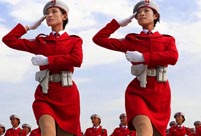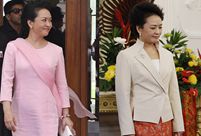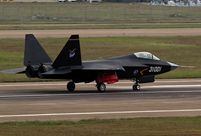 Close-up view of August Aerobatic Team
Close-up view of August Aerobatic Team
 Goddesses married in 2014
Goddesses married in 2014
 Polar region photos raise worldwide awareness of global warming
Polar region photos raise worldwide awareness of global warming
 Get off at the last stop — Beijing Subway in vision
Get off at the last stop — Beijing Subway in vision
 Top 100 beauties in the world!
Top 100 beauties in the world!
 Gallery: Who is the most beautiful one?
Gallery: Who is the most beautiful one?
 If you like autumn, put your hands in the air!
If you like autumn, put your hands in the air!
 Fan Bingbing's "Queen style" in new play
Fan Bingbing's "Queen style" in new play
 Lingerie show at 2014 Miss China
Lingerie show at 2014 Miss China
 J-10 fighters show aerobatic stunts in smog-free sky
J-10 fighters show aerobatic stunts in smog-free sky
The Judiciary
The courts of the Macao Special Administrative Region exercise judicial power independently. They are subordinated to nothing but the Law and are not subject to any interference. The Macao Special Administrative Region has the Court of First Instance, the Court of Second Instance and the Court of Final Appeal. The power of final adjudication is vested in the Court of Final Appeal of the Macao Special Administrative Region.
With the establishment of the MSAR, two new courts, the Lower Court and Administrative Court, came into being as constituent parts of the Court of First Instance. The Basic Law also permits the Lower Court to form specialised tribunals, as required, and to retain the Examining Magistracy created under the former Portuguese administration. The Examining Magistracy therefore functions as part of the Lower Court.
The Administrative Court has jurisdiction over administrative and tax cases. Appeals against judgments by the Administrative Court can be lodged with an intermediate court.
Judges of all levels of courts in Macao are appointed by the Chief Executive on the recommendation of an independent commission composed of local judges, lawyers and prominent members of the community. The presidents of courts of the Macao Special Administrative Region at all levels shall be chosen from among judges and appointed by the Chief Executive. The President of the Court of Final Appeal must be a Chinese citizen who is a permanent resident of the Region, and the appointment and removal of the President of the Court of Final Appeal shall be reported to the Standing Committee of the National People’s Congress for the record.
The Public Prosecutions Office of the Macao Special Administrative Region exercise procuratorial functions independently and free from any interference as vested by law.
The Public Prosecutor-General shall be a Chinese citizen who is a permanent resident of Macao. He or she shall be nominated by the Chief Executive and appointed by the central government. Other public prosecutors shall be nominated by the Public Prosecutor-General and appointed by the Chief Executive. The structure, powers, functions and remit of the Public Prosecutions Office are prescribed by law.
Commission Against Corruption
The Commission Against Corruption functions independently. The Commissioner Against Corruption shall be appointed by the Central People’s Government on the nomination of the Chief Executive. The Commissioner is accountable to the Chief Executive.
The Commission Against Corruption is responsible for tackling corruption and fraud. It investigates, in accordance with the law, corruption and fraud among civil servants and among individuals involved in voter registration and elections. It also promotes the protection of human rights, freedoms, legal guarantees, and legitimate rights and interests, as well as ensuring the justice, legitimacy and efficiency of public administration.
Commission of Audit
The Commission of Audit has been set up in accordance with the Basic Law. It functions independently and is not subject to interference. The Commissioner of Audit is accountable to the Chief Executive.
The main responsibilities of the Commission of Audit are to monitor the implementation of the MSAR Government budget, to conduct a “value-for-money” assessment on the subject of audit, and to monitor the expenditure management, efficiency and cost-effectiveness of the Government.
Unitary Police Services
The Unitary Police Service is part of the MSAR’s internal security system, and it is responsible for the coordination of the MSAR’s security affairs. It commands and leads police units that now include the Public Security Police and Judiciary Police.
Macao Customs Services
The Macao Customs Service (Macao Customs), a public body with administrative autonomy established in accordance with the Basic Law, is responsible for directing, implementing and supervising customs policy, as well as conducting policing functions such as customs administration and supervision (as specified in Article 1 of Law No. 11/2001).
9/2014
(Source: www.gov.mo)
 |
 20 years on: Relocated Three Gorges residents through lens
20 years on: Relocated Three Gorges residents through lens PLA HK Garrison veterans leave behind beautiful smiles
PLA HK Garrison veterans leave behind beautiful smiles Representative beauties of each province in China
Representative beauties of each province in China Chestnut girl goes viral online
Chestnut girl goes viral online Victoria's Secret Fashion Show
Victoria's Secret Fashion Show In photos: Bright and brave female soldier of PLA
In photos: Bright and brave female soldier of PLA China's charming first lady
China's charming first lady Excellent photos of Zhuhai Air Show
Excellent photos of Zhuhai Air Show China's heavyweight aircraft
China's heavyweight aircraft An old problem
An old problem Despite torture report, US escapes censure
Despite torture report, US escapes censure  Inflation hits five-year low
Inflation hits five-year low Runaway brides
Runaway bridesDay|Week|Month